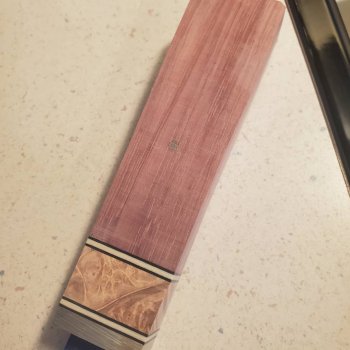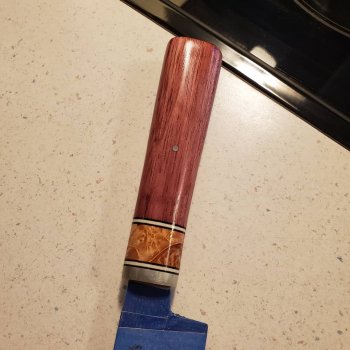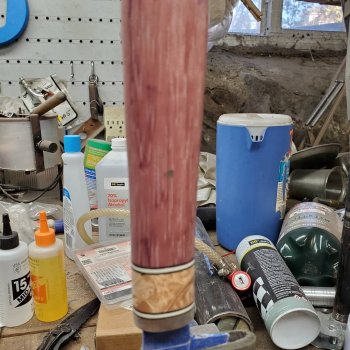You are using an out of date browser. It may not display this or other websites correctly.
You should upgrade or use an alternative browser.
You should upgrade or use an alternative browser.
Handle finish for Chef Knife
- Thread starter Gliden07
- Start date
I can't imagine why Tru-Oil wouldn't be considered safe for kitchen knives. I've used it on quite a few kitchen knives. What some silly commercial rules are I don't have a clue. After all, you can't get much sillier than not allowing high carbon for food prep and I've heard that's a no-no in places.
EdCaffreyMS
"The Montana Bladesmith"
Whats the handle material? Tru-Oil has some problems handling VERY hot water. Over several times of being exposed to very hot water, Tru-Oil will gradually start dulling, then turn slightly "milky"
I have a couple of Fossil Damascus kitchen knives (that I made) in the house with wood handles/Tru-Oil finish. Both have 12 coats. One is African Blackwood, and the other is Striped Ebony. Keeping in mind that at NO TIME have/will these knives be thrown into a sink of water, or placed in the dishwasher...... after use they are immediately cleaned with warm soapy water, then hand dried. (I don't have to worry about the blades, as they were finished out with clear Gun-Kote).
The African Blackwood handle looks like the day it was made. The Striped Ebony is a different story..... the finish has turned slightly dull/milky looking, with an odd texture/feel. Although I've not done a lot of experimenting, that situation tells me that various woods and/or non-synthetics have much to do with how the finish holds up on any given one.
Personally, if I build culinary cutlery for anyone, I ether use synthetics, or stabilized materials. There's a reason that the paperwork I send with a knife has this statement: "NEVER, NEVER, put your knife in the dishwasher (don’t laugh, a number of folks have done this and really wrecked their knife.)"
I have a couple of Fossil Damascus kitchen knives (that I made) in the house with wood handles/Tru-Oil finish. Both have 12 coats. One is African Blackwood, and the other is Striped Ebony. Keeping in mind that at NO TIME have/will these knives be thrown into a sink of water, or placed in the dishwasher...... after use they are immediately cleaned with warm soapy water, then hand dried. (I don't have to worry about the blades, as they were finished out with clear Gun-Kote).
The African Blackwood handle looks like the day it was made. The Striped Ebony is a different story..... the finish has turned slightly dull/milky looking, with an odd texture/feel. Although I've not done a lot of experimenting, that situation tells me that various woods and/or non-synthetics have much to do with how the finish holds up on any given one.
Personally, if I build culinary cutlery for anyone, I ether use synthetics, or stabilized materials. There's a reason that the paperwork I send with a knife has this statement: "NEVER, NEVER, put your knife in the dishwasher (don’t laugh, a number of folks have done this and really wrecked their knife.)"
opaul
Well-Known Member
That
That’s going to look great.View attachment 70735Nickel/Silver, Black, White, Black spacer, piece of stabilized Maple Burl, spacer material as before and a piece of Purple Heart. This is obviously the rough ground handle.
Gliden07
Well-Known Member
That
That’s going to look great.
Thank you Sir! I am trying to up my Game and not only make good knives but good looking!!
Dennis Morland
KNIFE MAKER
Agreed. Going to be a very nice handle.
EdCaffreyMS
"The Montana Bladesmith"
No matter what you do to it, the Purple Heart with "oxidize" over time, and turn a pale brown..... that's just it's nature....changes color dramatically with exposure to UV light. Tru-Oil...... you'll want to do 12-15 coats on Purple Heart....it has big, open grain, and you want to get the grain filled and sealed...especially on a culinary knife.
With the spacers....once the knife is completely finished......leave it alone for about a week, so everything can "equalize"..... very likely that the spacer materials will be a bit "proud" after that time (that is IF it is the vulcanized spacer material). Refinish it down and you should be done. THEN Tru-Oil the entire handle, and that should minimize any future issues.
With the spacers....once the knife is completely finished......leave it alone for about a week, so everything can "equalize"..... very likely that the spacer materials will be a bit "proud" after that time (that is IF it is the vulcanized spacer material). Refinish it down and you should be done. THEN Tru-Oil the entire handle, and that should minimize any future issues.
Doug Lester
Well-Known Member
As Ed implied, the wood makes a difference. I have a kitchen knife that has an African Blackwood handle that all I did was buff and even with the abuse I dish out (no dishwasher, though) it still looks great.
Doug
Doug
John Wilson
Well-Known Member
Tru-Oil is as good as anything I’ve found for kitchen knives. I have had two customers run their knives through the dishwasher and had to send them back for me to refinish the handle for them. I don’t know of any finish that will stand up to that. But my wife is probably harder on her knives than any customer of mine. She’s been a great product tester. It’s not rare for me to find a knife sitting underwater in the sink. My hair used to catch on fire but now I accept it as “unplanned destructive testing”. The good news is that they’ve all continued to hold up just fine.
Like Ed, I specifically state in my warranty letter not to do that, and that the dishwasher is a no-no.
Like Ed, I specifically state in my warranty letter not to do that, and that the dishwasher is a no-no.
Gilbert M
Active Member
I think that handle is going to be great. I probably go a little to far but I usually pull up a "msds" on things I use, and I stopped using nickel silver several years ago. Mostly I use 100% pure tung oil ,butcher block oil/wax,like stuff from skidmores right now I'm experimenting with tried&true linseed oil/ beeswax. As Ed said stabilized materials or sometimes a rosewood not stabilized. Though you can't get as much shine I sorta like the butcher block oil because the customer do that, I've even sent some with the knives. I really Tru oil on other than knives.
tkroenlein
Well-Known Member
Usually "milliners" in a wood finish is trapped water. (Makes sense, right?) A couple of decades ago, I worked for a fire & water damage restoration company. We used denatured alcohol take out some *very* heavy water stains from wood furniture. I'm not sure how Tru Oil would react, but it's easy enough to test a small spot. It's something I'd personally try on a personal knife or gun.
LOL. That autocorrect is so odd I'm going to leave it. *milkiness.
LOL. That autocorrect is so odd I'm going to leave it. *milkiness.



